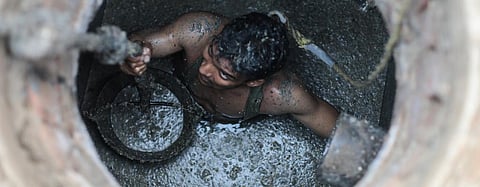

People practising occupations that are stigmatised are not only prone to various diseases but also lack social security, says a report named The State of Employment in India.
The report published by Oxfam, an international non-profit, was released in New Delhi on March 28. It lists butchery, rag picking, scrap metal collection and manual scavenging in the ‘stigmatised’ category.
The report says, “Working conditions of individuals working in stigmatised occupations are abysmal, with no social security benefits.”
Those working in the stigmatised industry face acute challenges, given their low social status and abysmal working conditions, which expose them to death-like situations or life-threatening diseases, says the report.
About the scale of workforce employed in stigmatised occupations, the report refers to several sources and says that it is enormous and "each of the industries hold significant positions in the economy."
According to the Oxfam report, the leather industry has around 2.5 million (25 lakh) labourers. Other than this, the number of families involved in manual scavenging in rural India are estimated to be 180,000. Oxfam has taken this figure from the 2011 Socio-Economic and Caste Census and says that the figures are under-reported. The Asia Dalit Rights Forum has suggested that there are about 770,333 manual scavengers in the country. Similarly, rag pickers in the country are estimated to be between 1.5 million and 4 million.
According to the report, all these stigmatised occupations fall in the informal economy except sanitation workers. Among them too, a small minority are a part of the organised sectors while the rest work on contract basis.
The report says that these occupations are influenced by the social institutions of gender, caste and religion as it compels members of Dalit and Muslim communities to opt for these jobs. For instance, 46 per cent of the total work force in the leather industry is Dalit.
Each of these industries plays an important role in the economy. Still, these workforces are governed by informal conditions of employment which lead to a situation where these workers do not have access to the social security provisions, paid leave, gratuity, and pensions.
Due to continuous advocacy by civil society and workers’ organisations, the state has intervened with legislations. However, the bureaucratic apparatus ensures that none of these provisions reach the workers, says the report.
It highlights the example of the Municipal Corporation of Greater Mumbai. In the country, contract labour regulations are applicable to establishments that hire more than 20 workers, but to bypass the provision, the Mumbai civic body has gone for outsourcing.
The report concludes that all the stigmatised occupations need urgent attention from state authorities so that these people can get decent working conditions and right to a meaningful livelihood.